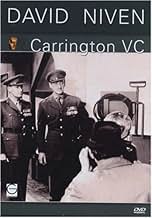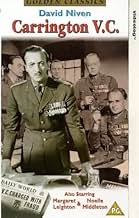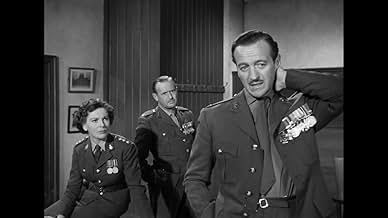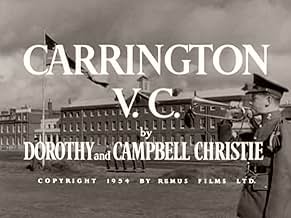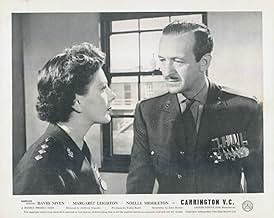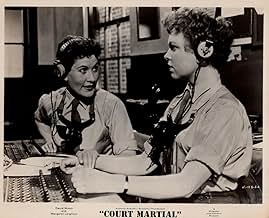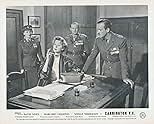Una corte marziale tenta di scoprire perché, e se, un ufficiale ha sottratto i fondi della sua unità.Una corte marziale tenta di scoprire perché, e se, un ufficiale ha sottratto i fondi della sua unità.Una corte marziale tenta di scoprire perché, e se, un ufficiale ha sottratto i fondi della sua unità.
- Regia
- Sceneggiatura
- Star
- Nominato ai 5 BAFTA Award
- 5 candidature totali
Recensioni in evidenza
This is quite a decent military court-room drama in which David Niven finds himself accused of pinching a large sum from his battalion funds. At the ensuing court martial, he must answer the charges relying on his honesty and integrity - he has a V. C. after all - and on receiving, somewhat naively, a reciprocal degree of honesty and integrity from others. It's quite a neat little story about revenge and snobbery; tempered with the odd bit of human decency and Niven is ideal for the part. Margaret Leighton is also quite good as his rather aloof wife and Allan Cuthbertson as his supercilious commanding officer "Col. Henniker" who clearly both have axes to grind. The ending isn't great, but otherwise it is a simple story well told.
Asquith's courtroom drama is surprisingly gripping. Trapped within the rigid confines of a military structure, a social structure and his own personal integrity, Niven plays a man whose career and reputation (if not his stiff upper lip) are at stake in a court martial.
This film was made sixty years ago and things have changed a lot since then; unless one bears in mind how things were then, this film's plot make less sense. However if you take this into account, it is a pretty good film.
it has been commented by others that there are commonly certain protocols observed whenever a VC holder enters a room; there is no formal requirement that this is done but traditionally VC holders may be saluted by others regardless of rank. This may or may not be the case within a court-martial situation but that this was omitted in the film is understandable since it would have been distracting to the thrust of the plot, with the whole court up and down like jack-in-the-boxes all the time.
Taken on its merits this is a pretty good film, IMHO deserving of a better score than it currently has on here.
This film was made sixty years ago and things have changed a lot since then; unless one bears in mind how things were then, this film's plot make less sense. However if you take this into account, it is a pretty good film.
it has been commented by others that there are commonly certain protocols observed whenever a VC holder enters a room; there is no formal requirement that this is done but traditionally VC holders may be saluted by others regardless of rank. This may or may not be the case within a court-martial situation but that this was omitted in the film is understandable since it would have been distracting to the thrust of the plot, with the whole court up and down like jack-in-the-boxes all the time.
Taken on its merits this is a pretty good film, IMHO deserving of a better score than it currently has on here.
The major theme of this film is the role of the war hero in a peacetime army. Carrington is an undoubted hero but the rule-breaking qualities that made him a hero are not welcome in a peacetime army where bureaucratic procedures are the norm, represented in this film by Henniker, Carrington's commanding officer and an unbending stickler for the rules. So, Carrington is romantic but wrong and Henniker is dull but right. The film, filled with great ensemble acting performances, invites you to choose which you prefer. At the time the film was made, Germany had emerged from the ruins of war with Europe's most dynamic economy whereas Britain, the victor, was mired in post-war decline. Carrington was the dashing war hero but Henniker is in charge now. Henniker, who avoided action in the war, with his Germanic name and blond hair. There's a nice metaphor here. Britain won the war, but who won the peace?
Imagine a cross between The Caine Mutiny and 12 Angry Men, and you'll get Court Martial. This military courtroom drama is tense, thrilling, and will keep you at the edge of your seat from beginning to end.
David Niven is a highly respected and decorated major, and he's been court martialed for three offenses: stealing money, entertaining a woman in his quarters, and leaving the base without permission. The entire film takes place in the courthouse, and it is intense! The men on the jury all know David Niven personally, and they try to put their bias aside for the sake of the law. Noelle Middleton, a captain, tries to defend him-but is she also biased, since she was the woman in his quarters? And finally, Niven's wife: Margaret Leighton. Niven insists she's too ill to testify, but when she shows up in court, will she condemn or defend him?
The acting in this film is fantastic, not only by Niven and his two leading ladies, but also by the supporting men on the jury. It's very hard to act in a real-time film, because you constantly have to have an emotional buildup in your character's performance-there's no "three weeks later" downtime in the plot, or a cutaway to another character's side-story. Anthony Asquith must have given his actors great direction, because they were all very convincing. John Hunter's script, based on Campbell and Dorothy Christi's play, is intelligent, thoughtful, and fast-paced; you're going to need to pay close attention on this one, but it's worth it! Unfortunately for this movie, it came out the same year as the more successful The Caine Mutiny, so the Academy forgot about the British drama at the Oscars. Although Humphrey Bogart was very good, David Niven absolutely deserved a nomination for his incredible performance.
David Niven is a highly respected and decorated major, and he's been court martialed for three offenses: stealing money, entertaining a woman in his quarters, and leaving the base without permission. The entire film takes place in the courthouse, and it is intense! The men on the jury all know David Niven personally, and they try to put their bias aside for the sake of the law. Noelle Middleton, a captain, tries to defend him-but is she also biased, since she was the woman in his quarters? And finally, Niven's wife: Margaret Leighton. Niven insists she's too ill to testify, but when she shows up in court, will she condemn or defend him?
The acting in this film is fantastic, not only by Niven and his two leading ladies, but also by the supporting men on the jury. It's very hard to act in a real-time film, because you constantly have to have an emotional buildup in your character's performance-there's no "three weeks later" downtime in the plot, or a cutaway to another character's side-story. Anthony Asquith must have given his actors great direction, because they were all very convincing. John Hunter's script, based on Campbell and Dorothy Christi's play, is intelligent, thoughtful, and fast-paced; you're going to need to pay close attention on this one, but it's worth it! Unfortunately for this movie, it came out the same year as the more successful The Caine Mutiny, so the Academy forgot about the British drama at the Oscars. Although Humphrey Bogart was very good, David Niven absolutely deserved a nomination for his incredible performance.
Major David Niven V.C. is up on charges. Two are minor, but the third one can break him, and possibly sent him to prison: that he surreptitiously took 125 pounds from the company safe. His defense is that he was owed the money, which no one denies, and that he told his Commanding Officer that he was going to do it. He told his wife, Margaret Leighton so over the phone; he also told fellow officer Noelle Middleton he had told his C.O. However, the C.O., Allan Cuthbertson, denies it. This being David Niven at the peak of his career, the movie is clearly slanted in Niven's favor, although the evidence presented to the Court is not. That's a necessary part of the dramatic tension.
Anthony Asquith directs this to bring out the ritual nature of Army life. The performances vary between those ritualized interactions, and things said in private in a very engaging fashion.
Asquith had begun his directing career in the silent era with a bang, with two late silent stunners, SHOOTING STARS and UNDERGROUND. Then something happened to his career in the mid-1930s. When he returned to directing in 1938, he specialized in films derived from stage works by Shaw, Rattigan and Oscar Wilde. The performances he got for these first-rate properties were wonderful, but they certainly seemed more staged plays than movies.
Although this movie is an original screenplay, it very much seems an opened-out play. Certainly, it is a a fine adaptation, but it would have taken little work to convert its borders to a proscenium arch. Despite this, it is a fine story with excellent performances all around.
Anthony Asquith directs this to bring out the ritual nature of Army life. The performances vary between those ritualized interactions, and things said in private in a very engaging fashion.
Asquith had begun his directing career in the silent era with a bang, with two late silent stunners, SHOOTING STARS and UNDERGROUND. Then something happened to his career in the mid-1930s. When he returned to directing in 1938, he specialized in films derived from stage works by Shaw, Rattigan and Oscar Wilde. The performances he got for these first-rate properties were wonderful, but they certainly seemed more staged plays than movies.
Although this movie is an original screenplay, it very much seems an opened-out play. Certainly, it is a a fine adaptation, but it would have taken little work to convert its borders to a proscenium arch. Despite this, it is a fine story with excellent performances all around.
Lo sapevi?
- QuizThe VC worn by David Niven was a genuine medal borrowed by the studio. It belonged to Arthur Henry Cross VC, Machine Gun Corps (Camberwell).
- BlooperA British court-martial appeal does not allow new evidence, as it is not a retrial of a case, but a trial of the trial itself, to argue improper procedure or other problems with the trial.
- Citazioni
Major Broke-Smith: What's he like?
Lt. Col. Reeve: Henniker? Proper bastard if you ask me.
- ConnessioniRemade as ITV Play of the Week: Carrington V.C. (1960)
I più visti
Accedi per valutare e creare un elenco di titoli salvati per ottenere consigli personalizzati
- How long is Court Martial?Powered by Alexa
Dettagli
- Tempo di esecuzione
- 1h 46min(106 min)
- Colore
- Proporzioni
- 1.37 : 1
Contribuisci a questa pagina
Suggerisci una modifica o aggiungi i contenuti mancanti

